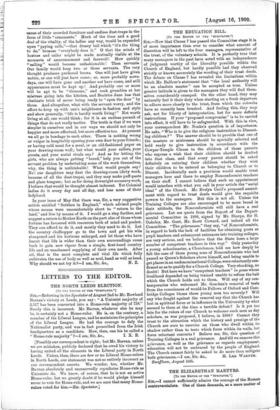THE EDUCATION BILL. [TO THE EDITOR OF THE “spEcraroal SIR,—Now
that Clause 7 has passed the Committee stage it is of more importance than ever to consider what amount of
discretion will be left to the four managers, representative of the trust, of the voluntary schools. It is perfectly true that many managers in the past have acted with an independence of judgment worthy of the liberality possible within the Church of England, but hardly possible had they observed strictly or known accurately the wording of their trust deeds.
The debate on Clause 7 has revealed the limitations within which Mr. Balfour's statement that "the local authority will be an absolute master " can be accepted as true. Unless greater latitude is given to the managers they will find them- selves considerably cramped. On the other hand, they may naturally feel it their duty when starting on a fresh departure to adhere more closely to the trust, from which the cobwebs have so recently been brushed. And feeling this, they may ask, not for liberty of interpretation, but for more definite instructions. If your "proposed compromise" is to be carried into effect, it will have to be safeguarded. With this in view, your correspondent Mr. Noake's question is of importance.
He asks, "Who is to give the religious instruction to Dissent- ing children ? " The answer should be to provide that one of the masters or mistresses should be specially selected and held ready to give instruction in accordance with the Cowper-Temple Clause to the children of those parents who express a wish that their children should be drafted into that class, and that every parent should be asked definitely on entering their children whether they wish their children to be entered as belonging to Church or to Dissent. Incidentally such a provision would enable trust managers here and there to employ Nonconformist teachers on their staff. I cannot believe that such an appointment would interfere with what you call in your article the " social ideal " of the Church. Mr. Evelyn Cecil's proposed amend- ment with regard to trust deeds would give the requisite powers to the managers. But this is not all. Unless the Training Colleges are also encouraged to be more broad in their attitude, the Nonconformists will still have a real grievance. Let me quote from the Report of the Depart- mental Committee in 1898, signed by Mr. Sharpe, Sir H. Oakeley, Mr. Gent, Mr. Scott Coward, and indeed all the Committee. "The grievances," they say, "of Nonconformists, in regard to both the lack of facilities for obtaining posts as pupil teachers and subsequent entrances into training colleges, are very serious, and we believe that the State loses a large number of competent teachers in this way." Only yesterday a young schoolmaster, a Churchman, told me how deeply he felt the case of three young sons of Nonconformists who had passed as Queen's Scholars above himself, and being unable to get places in an undenominational College, were reluctantly con- firmed so as to qualify for a Church College. Very shocking, no doubt ! But here we have "competent teachers" in posse whose livelihood depended on being trained unable to refuse the bait which the Church holds out to them. Will any of my con- temporaries who welcomed Mr. Goschen's removal of tests from the consciences of would-be Fellows of Oxford and Cam- bridge Colleges blame these young men too severely P Will any who fought against the removal say that the Church has lost in spiritual force or in influence in the University by what seemed to them at the time a terrible defeat P Is it yet too late for the rulers of our Church to welcome such men as day scholars, as was proposed, I believe, in 1888? Cannot they trust to the attraction which the history and prestige of the Church are sure to exercise on those who dwell within its shadow rather than to tests which force within its walls, but force reluctant converts ? Believe me, Sir, this question of Training Colleges is a real grievance. And till we remove this grievance, as well as the grievance as regards employment, education will not be embraced by the people of England. The Church cannot fairly be asked to do more than mitigate both grievances.—I am, Sir, &c., H. LEE WARNER. Swaffham, August 10th.


































 Previous page
Previous page